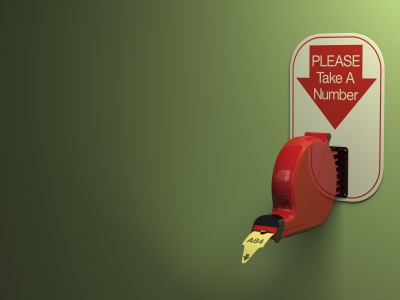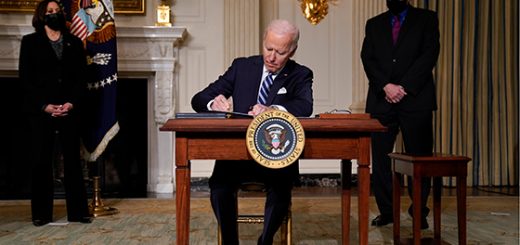Waiting for “free” health care.
Listen to the broadcast of You Tell Me on KTBB AM 600, Friday, August 17, 2012.
Let’s imagine for a moment that Congress passes a law called the ”Access to Quality Home Entertainment Electronics Act;” “AQHEEA” as it would surely (and unfortunately) come to be called.
Imagine that upon full implementation of this law, every American household becomes entitled to a voucher redeemable at any electronics retailer for an LCD TV. In other words, a “free” TV from the perspective of the consumer.
Further imagine that the law provides that every household is entitled to a new voucher for a new TV upon the determination by a government panel that “significant technological advances in home entertainment electronics subsequent to the date of beneficiary’s last voucher” had occurred.
What would happen?
Well, here’s where your imagination doesn’t have to work very hard. The shelves of every seller of U.S.-compatible LCD TVs would be stripped bare in a matter of days if not hours. From that moment, and stretching into the indefinite future, LCD TVs would be in chronic short supply. If you wanted or needed an LCD TV, your name would go on a list and your government TV voucher would then simply represent your right to wait.
An absurd illustration you might say. But it’s not.
It has already happened.
The only difference between this imaginary scenario and the real world is the fact that instead of LCD TVs, the “free” commodity in question consists of access to a broad range of health care services including annual check-ups for seniors, breast and pelvic exams for women, contraceptives and a laundry list of tests and procedures as set forth by the U.S. Preventive Services Task Force.
The law mandating all of this is called “Obamacare.” And its central problem is that the health care industry no more has the capacity to provide all of these “free” services than the electronics manufacturing industry has the capacity to put a “free” LCD TV into every American household.
In both illustrations, the problem becomes that of demand exceeding supply.
In freely-functioning markets, when demand exceeds supply, the mechanism for clearing the market is price, denominated in money. (On the other side of this teeter-totter, when the price gets high, the market reacts by moving to increase supply.)
But when money is removed as the mechanism for clearing the market – as will happen under Obamacare and as is happening now under Medicare – causing the service provided to be widely perceived as “free,” the rising price gets paid in time. You get your free TV, you get your free mammogram.
But you have to wait.
Assuming that the purpose of a health care industry is to prolong and improve human life, legislating away money as the economic mechanism for clearing the market and substituting in its place time is the worst possible allocation of resources.
It is, after all, time that eventually gets us all. As my dad used to say, “If you live long enough, boy, you’re gonna die.”
Paying for health care in time, in the form of waiting for services, at best prolongs the discomfort arising from the condition that occasioned the need for health care in the first place and at worst leads to premature death.
If Congress were to ever consider a free LCD TV law, it is likely that those most in favor of it would be those least able to afford an LCD TV on their own. When LCD TVs became immediately scarce, the very same people would then feel they had been lied to.
So it will be when the laws of economics impose themselves upon the fantasy of Obamacare. And so again will the elderly and the poor suffer at the hands of government purporting to help them.









Just saw your TV gig on this subject. Since you are imagining a lot of hypothetical scenerios here. You sounded to suggest that our current amount of Drs and hospitals can not service 30 million additional people into the health care system. Well that makes me imagine that if every single American was able to afford and did have health care coverage right now we would be in that same fix. So that would be a bad thing if every single American had their own health care coverage even without any kind of Affordable Care Act? People would complain? They would say that they wished about 30 million people would become unable to have health care coverage? Sounds like a mechanical heart to me. So now that we are both over with putting out hypothetical situations….what is your suggestion to getting these up to 49 million people without health coverage into a system where they do have health care coverage? If it’s not a program that supports health care coverage for all then how do we get everyone in America covered? That has to be the only thought of and acceptable goal for nobody deserves health care coverage anymore than anyone else. If I work my tail off for food stamp wages allowing my business owner(s) to become rich enough to afford their own health coverage, and they pay me not enough wages to afford my own insurance….then what have I done? I not only made them rich but I also extended their lives as well as the lives of their family members. And what have they done? They’ve taken advantage of hard working poverty poor Americans who are striving to have enough money to put in to their gas tanks to get to work and to the food stamp office. As stated the goal is to get everybody in America covered for health care…and if some person that I helped make rich has to stand in line behind me to get services then so be it. It’s called waiting your turn in line. But I would still like to hear your suggestion on how to get these millions of people in to the health care system…you didn’t address that problem. You only addressed the problems the health care system is going to have delivering services to that many new members who deserve health care just as much as somebody who has always had health care coverage.
Paul,
You should have used “free hamburgers” at McDonald’s to prove your point to the intellectually challenged Marxists that hate the RICH because they think the POOR made the RICH possible.
McDonald’s would be flooded with customers all the time. Those of us that didn’t want to wait in line, would decide to BUY our own hamburgers at another restaurant due to better service, quality, and convenience – a restaurant that probably observed the profit motive, God forbid!
Of course, the intellectually challenged Marxists would still complain that this was unfair and insist that “purchasing our own hamburgers” to avoid long lines should be outlawed. The utopian belief in tyranny (mastermind control of our lives in the interest of FAIRNESS) takes my breath away.
Where is it written that EVERYONE should have health coverage, or food (food stamps), or shelter, or clothing, or transportation without paying for it “by the sweat of their brow”? How did these degenerates accept a philosophy that society owed them ANYTHING without working for it?
If we forced the minimum wage to be $100,000 a year for a family of four, then, EVERYONE could afford all of the above and then how do we handle those that refuse to work? Why would anyone need to develop skills that could pay more than $100,000 if they could be paid this for a low skilled job? Wouldn’t inflation explode if low skilled individuals were paid this outrageous salary?
Clearly, elite government dictators that force labor and wage controls upon society, by law, is a solution to the UNFAIRNESS of a nation built on the free enterprise system.
Likewise, if the government were to provide all the necessities of life for free (no work requirement), there would be no poverty. Isn’t that wonderful?
Why would anyone seek any advanced training, degree, or skill, if there was no monetary reward to make that effort worthwhile? Where would we find the doctors, policeman, firefighters, teachers, machinists, farmers, pilots, salesmen, engineers, architects, journalists, publishers, broadcasters, etc? The Marxist worships “equal outcomes” at the expense of the “merit system” that itself creates a wealthy society with EVERY imaginable spectrum of skills to maintain that wealth.
Why is this so hard to understand? The choice is either Marxist tyranny or free enterprise. It is clear that some men live a life of covetousness and envy because they can’t accept the fact that they are “beggars at heart” and refuse to be self-sufficient through HARD WORK.
So what is the big fear about allowing persons with pre-existing conditions, sometimes through no fault of their own, being allowed to get insurance like the rest of us. I would rather have someone like that have access to medications or out-patient care that might keep their condition under control, and be more cost effective, than have them cluttering up ER’s and unable to pay (tax payers will pay that in the end as well).
“So what is the big fear about allowing persons with pre-existing conditions … being allowed to get insurance?”
Reply:
Why not force insurance companies to provide fire insurance for a homeowner whose house has caught fire? That is not insurance; it is WELFARE. Most states have a HIGH RISK insurance pool to take care of these situations at a higher premium cost.
We are not a nation of angles. There are many that deliberately avoid buying health insurance so they can buy the LCD TV, I-Pad, fancy tires, gourmet coffee, alcohol, and lottery tickets, etc., because they have bought the LIE (that YOU have) that society must take care of them if their health fails. The ER coverage for these irresponsible people is the fault of a stupid government that is willing to tax the responsible citizen to pay for this out of “fairness”, run amok. It is simply another case of Socialists-Marxists buying votes with your tax dollars . . . not “fairness” at all!
Q.E.D.
“Angles” appear in geometry. “Angels” come from heaven. Someone needs to invent a “spell checker” that can read our minds.